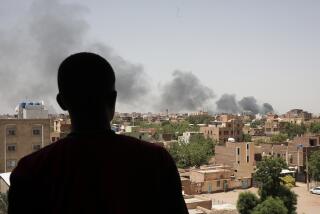Aging U.S. Copters Sent to Somalia, Pakistani Charges
- Share via
MOGADISHU, Somalia — A senior Pakistani official Sunday charged that the U.S. military is leasing obsolete helicopters to the U.N. peacekeeping force the United States is leaving behind in Somalia, and he indicated to the visiting chairman of the U.S. Joint Chiefs of Staff that without better equipment the entire mission could be jeopardized.
In a news conference closing his 22-hour tour of U.S. and U.N. camps in the lawless Somali capital, Gen. John M. Shalikashvili said he will review Pakistan’s request when he returns to Washington.
He also confirmed that the eight AH-1S Cobra attack helicopters that Pakistani pilots will fly over Somalia under a $40-million U.S. rental agreement came from old stock in the Hawaii National Guard.
Pakistani Foreign Minister Sardar Assef Ahmed Ali told reporters that some of the Cobras have 45 minutes of flying time left before they are no longer airworthy.
Assef and Pakistani Defense Minister Aftab Shahban Mirani, during a visit here to celebrate the Islamic holiday Eid al Fitr with Pakistan’s 5,500 troops, lodged their complaint with Shalikashvili and also urged him to provide additional air power to the U.N. forces, including scout helicopters and aerial surveillance equipment.
But Shalikashvili said Pakistani officers, who will command the largest single force after the last U.S. soldier withdraws March 25, told him Saturday night that the equipment already leased will give them enough force to continue the mission.
The 10-month lease includes 30 U.S. tanks and 80 armored personnel carriers.
Still, Assef’s comments underscored a sense of bitterness and abandonment among the largely Third World armies that will stay behind after the United States and a dozen other Western and Middle Eastern nations withdraw their last troops from Somalia in the next two weeks.
“Are Pakistani lives worth less than those that come from the West?” Assef asked, referring to what he called the “outmoded and substandard” Cobra helicopters.
He said the pullout, ordered after the United States suffered high casualties in a firefight last October, could open the United Nations and the West to charges of racism.
“We are very dismayed by this,” Assef said of the remaining peacekeeping force that will be almost entirely Asian and African--among them the Pakistani force that arrived in September, 1992, months before thousands of Americans landed on the beaches of Mogadishu.
“It is beginning to look like Europeans for Bosnia, and Africans and Asians for Somalia,” he said, adding that it “smacked of racism.”
Assef said that if Shalikashvili and the U.N. Security Council cannot satisfy Pakistan’s concerns, “we will have to take a very careful look at what sort of role we are going to have in the future--and if we are going to have a role.”
Privately, U.N. military officers said the Somali mission almost certainly will collapse if Pakistan, which suffered more casualties here than the United States, decides to withdraw.
Asked whether he believes that the United States, which initially led the mission to save Somalia from famine and self-destruction, is abandoning the country, Assef said: “Life in America is very good. Nobody in America wants to die for anybody else’s causes.”
Shalikashvili gave the opposite message Sunday.
Speaking to hundreds of U.S. Army, Air Force, Navy and Marine personnel through a field megaphone inside Mogadishu airport’s cavernous hangar, Shalikashvili said: “We all came here not because we wanted to get any credit for it . . . but for no other reason than to help someone else, someone in need. That’s an awful noble thing to do.
“I leave here with a very good conscience,” the chairman told reporters at Mogadishu’s heavily guarded airport moments before his Boeing 707 left for home. “I leave here thinking about the good things we have done. And I leave here with a guarded optimism about what lies ahead.”
That optimism came despite spreading anarchy throughout the country and his own top commanders’ assessments that lawlessness will increase after the U.S. soldiers leave.
Underscoring such concerns, two rounds apparently fired from a mortar or rocket launcher in the capital exploded at sea a few hundred yards from several U.S. warships and from the seaside headquarters of the U.S. commander, Maj. Gen. Thomas Montgomery, where Shalikashvili spent Saturday night.
U.S. Army spokesman Col. Steve Rausch said it was unclear what was targeted.
Before his departure, Shalikashvili addressed fears that the U.N. mission--indeed, the Somali nation--will disintegrate after the U.S. peacekeepers exit, leaving behind about 1,000 American diplomats and civilians on shore and only about 50 U.S. Marines to guard them.
“You and I hope that after we’re gone, the Somalis will put their country back together,” he told the American forces. “No one can erase the good that you and your buddies did here. And for the Somalis, well, we can’t guarantee their safety for the rest of their lives.”
More to Read
Sign up for Essential California
The most important California stories and recommendations in your inbox every morning.
You may occasionally receive promotional content from the Los Angeles Times.













